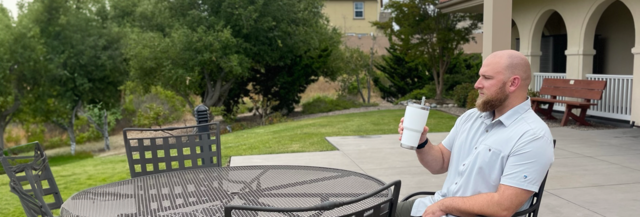Army veteran Matthew Melancon, one of the first elective double amputees travels yearly from his home in Utah to San Diego to be refitted for specialized prosthetics that allow him to maintain an active lifestyle. He receives support and comfort while staying at the Camp Pendleton Fisher House.
Almost every year since 2016, Army veteran Matthew Melancon makes the trip from his home in Utah to San Diego, California where he spends two weeks going through what should be three months of prosthetic care. Fortunately, Fisher House gives him a place to recharge after each long day of appointments.
“Having my own space is just so nice. And I can just kind of like, allow myself to just really reboot, just like do the full power down. Not this constant on as if I was staying at some sort of communal center or if I was in a hotel where it's just so sterile. Here I'm not alone,” said Matt. “It just gives me the strength to wake up the next day and just go back at it and just not give up all that process.”
Matt’s medical journey began while he was serving in the Army in 2011. On his second deployment, while in Patika Province, Afghanistan, his vehicle struck an IED. He suffered bilateral calcaneal fractures, meaning both his heels were shattered.
When he was stable enough for the trip back to the United States, Matt was sent to Brooke Army Medical Center in San Antonio, Texas. Initially, his care plan was to do limb salvage at the Center for the Intrepid. His father had had complications from Agent Orange exposure during his service in Vietnam and had just had his leg amputated three months prior to Matt’s deployment to Afghanistan. His grandmother had also lost her leg to diabetes. After watching their struggles, he was strongly against amputation.
“I did not want to lose my legs, so for about two years I just really, really struggled with the limb salvage process. It was pain management and everything,” said Matt.
In 2013, when his leg became infected, Matt was medically retired from the Army. At 23 years old, he realized that he couldn’t take the stress and anxiety that came with pain management for the rest of his life. That same week, he prepared for his first amputation. To his surprise, the amputation offered him freedom that he thought he would never have again as he got involved in recreational therapy programs that broke down his perspective of what an amputation meant.
“Within a year of that first amputation, I had worn out my entire ankle fusion that they had spent two years trying to give me,” he explained. “I discovered I liked recreational snowboarding.”
Throughout the time that he learned to live with his new prosthetic leg, his remaining leg continued to be a problem with significant pain. So, he requested to have it amputated as well. One year and a week apart, in July of 2014, he had his second leg amputated. Within 31 days, he was on the parallel bars in physical therapy to prepare for prosthetic legs.
“It was like having a heavy cloud over my future lift,” he said. “My prosthetics are not my disability. You know, quite the opposite.”
Despite the liberation that Matt felt, he still knew there had to be a way to live the active life he needed. His medical team back home in Utah tried a prosthetic fitting that left him uncomfortable just taking care of daily tasks. After all his hard work getting to be involved in adaptive sports and celebrating his courage to find the strength to amputate his legs for a better future, he found himself at a low point.
He sought a new solution that would allow him to do the widest array of activities possible with prosthetics, but the solution would have to be complex because he needed perfect performance from both sides. Thanks to his connections in adaptive sports and his athletic network, a world-renowned prosthetist in San Diego offered to help. While his medical care was covered by the VA, his travel costs were not.
Over the next few years, he considered giving up because of the high cost of travel, but then he found Fisher House.
Matt now stays at the Camp Pendleton Fisher House in Oceanside, California with his wife, Alexa, when he returns for his yearly appointments. She encourages him and runs with him as he gets used to his new prosthetic legs. The couple also enjoys the back patio where she grills out and they enjoy dinner together after his appointments.
“Having that sense of calm when I come back here [to the Fisher House], those hours of reprieve in between going out and advocating for myself. This questioning and self-doubt that can just come rushing into this process and then I come back here to this sense of calm and of community,” he explained.
Matt and Alexa have gotten to know many of the other guests including a Korean War vet who also was being fitted for new prosthetics.
“My wife was able to just make such great friends and chat with all these lovely people and everything. And that's, that's good for her. She feels less of a caregiver and more of like my wife on my journey with me.”
Matt will have many years of appointments to go, but he knows Fisher House will be there for him.
“Now as I sit here, I'm trying to navigate my care and maintain the best version of myself that I've worked so hard to build,” said Matt. “It's so nice to just know that these [Fisher Houses] are out there. To just know that I have that kind of network and that resource out there to help me through everything.”




















